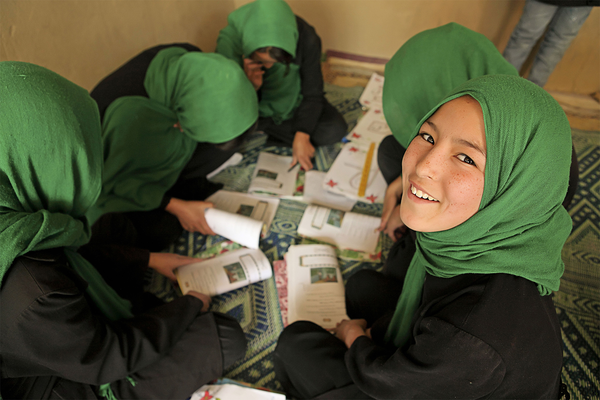CCP Receives $35-Million Grant to Strengthen Household Health Care Practices in Mali
The Johns Hopkins Bloomberg School of Public Health’s Center for Communication Programs (CCP) was awarded a five-year grant from the United States Agency for International Development (USAID)’s mission in Mali to conduct social and behavior change communication and social marketing (SBCC/SM) activities in that country. Grant activity will strengthen Malians’ ability to lead healthy, productive lives by promoting malaria prevention and treatment, good nutrition and hygiene practices as well as reproductive health behaviors like family planning. Pairing social and behavior change communication with social marketing, the initiative will inspire households to acquire healthy behaviors and give them access to life-saving health products.
This new program emphasizes collaboration at every level. The CCP team will work closely with Malian partners to foster communication between couples as well as to build strong mentoring relationships between indigenous NGOs and high-level technical assistance providers. What’s more, marketing of family planning and other products, as well as new health services, will be tied together with a common branding platform. The project will advocate for the private sector to play an important role in distributing a wide array of products and services as well.
Grant activity includes working closely with a successful Malian NGO to build an independent organization that will lead SBCC and social marketing efforts in Mali after the project is complete.
“This behavior change and social marketing project is a new way of thinking about health behaviors, social marketing and social change,” says CCP Director Susan Krenn. “We will implement a robust, integrated and sustainable program that takes advantage of positive indigenous beliefs and practices and channels them to support progress toward health outcomes.”
Mali, a West African nation with a population of 15 million, suffers from poor maternal and child health, low immunization rates and lack of access to information, products and services.
Women have low status in Malian society, a condition that results in poor health outcomes. When men and women are involved in community dialogues where health problems and the gender and social norms that facilitate them are discussed, health outcomes—and gender dynamics—improve. The SBCC/SM project will facilitate dialogue at all levels around family dynamics, enabling Malians to discuss, reflect and adopt new norms that will support new behaviors over the long term.
Communication tools, including videos of Malian men demonstrating gender transformative behaviors and attitudes such as cooking or caring for children, will be screened and discussed in community forums. These will lead to constructive dialogue about gender and decision making and embrace a set of behaviors and beliefs that lead to healthier outcomes. This transformation will be supported by neighbors, community structures and national policies.
Media, including interactive radio programming, a couples’ game show and a “micro-series” television comedy, will promotethe project’s objectives on a national level.
“Champions of change”— celebrities, religious leaders, traditional leaders and local public opinion influencers will be recruited for these campaigns to increase political and popular support for transforming gender norms and health-related behaviors.
CCP will partner with the Futures Group and Management Sciences for Health (MSH). Futures Group will provide technical assistance in social marketing and MSH will oversee institutional development activities.
“The ultimate indicator of our success will be our ability to imbue Malian counterparts with the inspiration and skills needed to sustain efforts beyond the life of project,” Krenn says.
###
With representatives in more than 30 countries, CCP designs and implements strategic communication programs that influence political dialogue, collective action, and individual behavior change; enhances access to information and the exchange of knowledge to improve health and health care; and conducts research to guide program design, evaluate impact, and advance knowledge and practice in health communication.
For more information, contact Claudia Vondrasek: cvondrasek*AT*jhu.edu.





